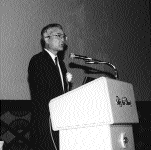Welcom Address

| Tamotsu Nomakuchi Chairperson of the RWC'97 Executive Committee |

| Tamotsu Nomakuchi Chairperson of the RWC'97 Executive Committee |
Thank you very much for joining the 1997 Real World Computing Symposium from all over the world. As the leader of the organizer, I am very pleased and encouraged by the presence of so many participants today.
The Real World Computing Project is designed to develop the Real World Computing technologies which will become indispensable for processing and handling diversified real world information in its various forms for our highly information-oriented society. Since 1992, the Real World Computing Partnership has played a key role in this project in cooperation with the Electrotechnical Laboratory and domestic universities, as well as overseas universities and research institutes in Germany, Sweden, Singapore, and elsewhere. The end goal of the RWC Project was to develop new technologies leading to future information processing in three main areas: Theory and Novel Functions, Massively Parallel Software and Architectures, and Optical Devices and Systems.
As Mr. Nakagawa of the Ministry of International Trade and Industry stated in his speech, this project has already produced certain results, and a number of RWC-related research papers have been published in Japan and other countries.
Also, as Mr. Kitaoka, President of the Real World Computing Partnership, mentioned in his remarks, specific outcomes include an operation technology which is based on the integrated comprehension capability of human voices and gestures implemented on personal computers, and recognition technologies for facial images and sign language in the area of novel functions. In the fields of Optical Devices and Systems and Massively Parallel Software and Architectures, a massively parallel computer and its operating system, a massively parallel language, and optical interconnection in addition to many other projects have been developed.
In this symposium, some 90 papers will be presented concerning RWC achievements and 34 demonstrations will be held at 25 booths. I hope you will enjoy the RWC presentations and demonstrations, and will join discussions regarding its activities and results.
From April 1997, the Real World Computing Project will be enhanced and renamed as the "Next Generation Fundamental Information Technology Project." In this symposium, that new phase of this project will be outlined. To this end, Professor Hidehiko Tanaka of the University of Tokyo will deliver a lecture on future information processing technology, following the keynote address by Dr. Junichi Shimada, Managing Director of the Real World Computing Partnership. Also, Dr. Koichiro Tamura, Director of the Electrotechnical Laboratory and an expert on the subject, will provide us with a special lecture on information science and technology. Mr. Takashi Tachibana, a well-noted writer and a visiting professor of the University of Tokyo, has accepted our request to deliver a lecture on the relationship between information technology and society in a broad and insightful perspective that exceeds the framework of science and technology. Mr. Tachibana's talk will be suggestive and will encourage all of us to think of effectively applying technology development to our society. Professor Paul Mc Kevitt, of Aalborg University, came all the way from Denmark to give a special lecture on the current situation and changes in the research and development of intelligent multimedia in a global context.
I am sure that this symposium will offer you an opportunity to understand the present status of information technology and discuss a wide range of subjects that should lead to future developments.
It is our desire that the results of our project be distributed throughout the world and serve as a driving force for the worldwide development of the information industry. To this end, we earnestly solicit the understanding and cooperation from all people concerned.
On behalf of the Executive Committee of the 1997 Real World Computing Symposium, I would like to thank all the participants, the members of the advisory group for their valuable advice in the preparation of the symposium, and the many others who provided us with their great help. I hope you will enjoy and actively take part in this three-day event.